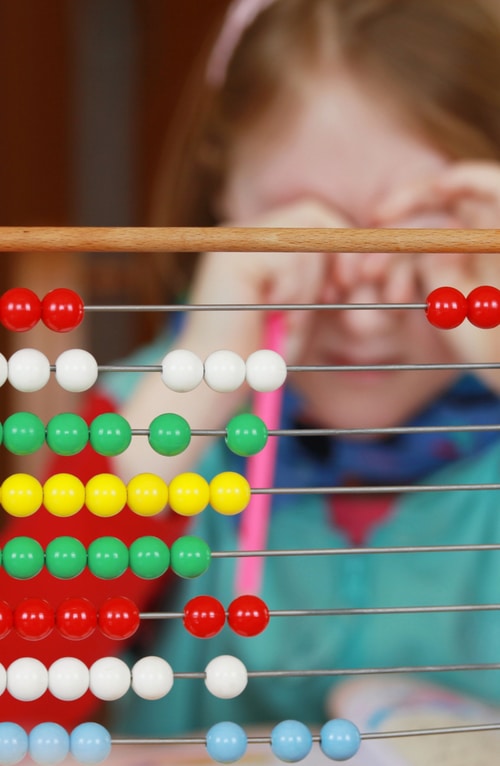Dyscalculia is a complex and often misunderstood learning difficulty that presents challenges with numbers, problem-solving, and mathematics. It can lead to many difficulties surrounding the comprehension of mathematical concepts. However, with person-centred and compassionate support, individuals with dyscalculia can make significant progress in improving their skills and overcoming challenges, ultimately leading to independent and fulfilled lives.
What is Dyscalculia?
Dyscalculia is a learning difficulty that impacts a person’s ability to comprehend mathematical symbols and relationships between numbers and perform mathematical operations. The exact cause of this learning difficulty remains unknown, but theories suggest that neurodiversity and differences in brain functioning result in dyscalculia. Importantly, dyscalculia does not impact a person’s intellectual capacity.
Typically, signs of dyscalculia become evident during childhood, but unfortunately, many individuals may not receive a formal diagnosis until adulthood. People with dyscalculia experience significant challenges with mathematics, leading to frustration, anxiety, and even depression due to the difficulties they face with numbers and mathematical operations.
Occasionally, dyscalculia is associated with terms like ‘math dyslexia’ or ‘number dyslexia.’ However, avoiding such misconceptions is crucial, as dyslexia primarily involves difficulties with reading, while dyscalculia is centred explicitly around mathematical challenges.
Types of Dyscalculia
Dyscalculia manifests in various types, each presenting specific characteristics and challenges.
Some types of dyscalculia are:
- Verbal dyscalculia – challenges with recognising numbers when they are presented verbally
- Lexical dyscalculia – challenges with writing and understanding mathematical symbols
- Graphical dyscalculia – difficulties with reading, writing or using the correct numbers and symbols
- Operational dyscalculia – challenges with written or verbal mathematical operations
- Acquired dyscalculia – dyscalculia develops later in life, often due to brain injuries
Every individual is different, with a unique learning journey. At LD Network, we proactively help individuals with dyscalculia overcome obstacles and learn mathematical skills through person-centred and tailored support.
Signs and Symptoms of Dyscalculia

The signs and symptoms of dyscalculia present differently from person to person. These indicators usually become noticeable during primary school when children begin to develop foundational learning skills. However, it’s essential to acknowledge that signs may not always be apparent until later stages, such as adolescence, or even adulthood.
Before we list the common signs, we want to emphasise that children and adults with dyscalculia often find ways to cope with math challenges and their specific learning difficulties, which can make it difficult to diagnose dyscalculia. Early tests and diagnosis are vital for designing and providing personalised support and care.
Signs and Symptoms of Dyscalculia in Children
It is important to emphasise that not all children who experience challenges and difficulties with mathematical concepts, symbols, and operations necessarily have dyscalculia. For this reason, it becomes crucial to identify and understand the common symptoms associated with math difficulties at different ages. This is essential in providing appropriate support to effectively meet each child’s unique needs.
Primary School
Common signs of dyscalculia in children during primary school include:
- Significant difficulty with learning to count
- Challenges with the comprehension of numbers
- Difficulty in associating a number with a real-life situation (e.g., connecting the number 2 to the situation of having 2 candies)
- Difficulty with recognising symbols associated with numbers (e.g., associating the number 4 to the concept of 4)
- Frequent mistakes
- Incorrect symbols (e.g., confusing 9 with 6, or 3 with 8)
- Forgetting one or more numbers in a series
- Difficulty classifying objects by shape and size
Personalised support from an early age is vital for overcoming challenges in childhood.
Secondary School
Common signs of dyscalculia in children during secondary school include:
- Difficulty with recognising mathematical symbols
- Difficulty in learning or remembering basic mathematical structures
- Difficulty with understanding concepts like “more than” or “less than”
- Using fingers to count
- Challenges with adding or subtracting
- Challenges related to the process of reasoning in mathematics
- Difficulty with telling time
- Challenges with applying mathematical skills and ideas in the day-to-day (e.g., a budget)
- Difficulty understanding graphs or maps
Personalised support and care can help children and teenagers develop their mathematical skills and overcome challenges associated with dyscalculia.
Signs and Symptoms of Dyscalculia in Adults
Common signs of dyscalculia in adults include:
- Difficulty counting backwards
- Slow performing calculations
- Challenges with arithmetic skills and arithmetic facts
- Challenges with estimation
- Difficulty remembering number-related information (dates or facts)
- Frequently late
- Anxiety surrounding mathematics
- Challenges with telling time
Some people with dyscalculia do not get diagnosed until adulthood. With compassion and understanding, adults can overcome challenges related to dyscalculia and learn vital mathematical skills through proactive strategies.
Dyscalculia Diagnosis
Dyscalculia diagnosis involves a comprehensive assessment conducted by qualified professionals. The process typically begins with a thorough review of the individual’s developmental history, academic performance, and mathematical challenges reported by parents, teachers, or the individual.
Early detection of dyscalculia is vital, enabling schools to provide timely resources and guidance. Proactive communication between parents and educators is crucial in identifying potential signs or symptoms, as this can lead to discussions with general practitioners (GPs) about appropriate tests and treatment processes. The assessment may include observing the individual’s problem-solving strategies and basic math-related skills and identifying other possible causes like vision difficulties and hearing challenges.
By collaborating closely with healthcare professionals and educational experts, parents can ensure their child receives a comprehensive evaluation and the necessary support tailored to their needs.
Possible Causes of Dyscalculia
The cause of dyscalculia is still unknown.
The precise cause of dyscalculia remains a topic of ongoing research, and while a definitive answer has yet to be found, several theories have been proposed. One prevailing theory suggests that individuals with dyscalculia may exhibit distinct variations in certain brain regions, implying a connection to neurodiversity. It is important to note that dyscalculia is a learning difficulty and does not impact overall cognitive ability. In fact, individuals with dyscalculia often possess strengths in other areas, such as writing, drama and art.
It is crucial to approach dyscalculia with empathy, understanding, and support, recognising that it is a learning difficulty that affects individuals across different age groups and backgrounds. By promoting awareness and implementing tailored interventions, we can help individuals with dyscalculia overcome challenges and enhance their mathematical abilities, fostering inclusivity and empowering neurodiverse perspectives.
Dyscalculia Treatment
Effective treatment approaches for dyscalculia can significantly improve the skills and abilities of individuals, regardless of their age. While customised programs tailored to the specific needs of children are commonly employed, it is important to recognise that dyscalculia can also be effectively addressed in adults.
Children tend to respond well to treatment due to their developing brains, and customised learning programs are often implemented in educational settings. These programs may employ multisensory techniques, interactive activities, and individualised instruction to provide targeted support for children with dyscalculia. Early intervention and ongoing support can help people overcome the challenges associated with dyscalculia.
However, it is crucial to emphasise that dyscalculia treatment is not limited to children. Adults with dyscalculia can also benefit significantly from targeted interventions. Effective learning programs that address specific difficulties associated with dyscalculia are available for adults. These programs may incorporate strategies to enhance problem-solving abilities and develop mathematical reasoning skills. Additionally, adult learners may benefit from assistive technologies, visual assistance, and adaptive learning approaches that cater to their individual needs and learning styles.
In both children and adults, a comprehensive approach to dyscalculia treatment often involves a multidisciplinary team. The team collaborates to assess the individual’s strengths and weaknesses, identify specific areas of difficulty, and develop a personalised treatment plan. This plan may include ongoing assessment, targeted instruction, progress monitoring, and supportive accommodations to ensure continued growth and success.
Related Conditions with Dyscalculia
Many challenges can co-occur with dyscalculia. Personalised and person-centred support is crucial for individuals to receive care tailored to their unique needs.
Related challenges that often co-occur with dyscalculia are:
- Attention-deficit hyperactivity disorder (ADHD)
- Dyslexia
- Sensory Processing Disorders (SPD)
- Autism Spectrum Disorder
- Dysgraphia
- Dyspraxia
People with dyscalculia may also experience difficulties with mental health challenges, such as anxiety and depression. Compassionate support and assistance can help individuals overcome mental health challenges and gain confidence in their abilities.
Dyscalculia and Dyslexia
Dyslexia and dyscalculia are both learning difficulties. It is a common misconception that they involve similar challenges.
Dyscalculia is a learning difficulty that affects a person’s ability to understand mathematics concepts. However, Dyslexia is a learning difficulty that affects a person’s reading, writing, or spelling ability.
With proactive and consistent support tailored to individual needs, people can overcome challenges associated with learning difficulties, boosting their self-esteem and mental well-being.
Living with Dyscalculia
Mathematics plays a significant role in numerous aspects of everyday life, from following recipes in cooking to calculating distances for travel. However, many adults experience shame, low self-confidence, and low self-esteem due to challenges with dyscalculia.
Recognising the presence of dyscalculia can be a transformative step, as it allows individuals to understand the root of their obstacles and reframe their self-perception. Embracing assistive tools like calculators and smartphone applications for managing finances, tracking expenses, and handling bills can prove immensely beneficial. With the right support and accommodations, people with dyscalculia can make adjustments that simplify their daily life and foster greater independence.
Seeking treatment and receiving support can significantly improve an individual’s overall quality of life, enabling them to lead a fulfilling and empowered existence.
How LD Network Support People with Dyscalculia?
LD Network provides person-centred support to individuals with learning difficulties, learning disabilities, and complex needs, helping each person we serve live fulfilled and meaningful lives.
People with dyscalculia can develop their skills and abilities with personalised care and customised learning and education programs. With committed and dedicated support, individuals can learn how to navigate tools and resources to overcome their challenges.
Our team of compassionate clinicians work alongside people with dyscalculia to help them find ways and techniques to improve their mathematical skills.












